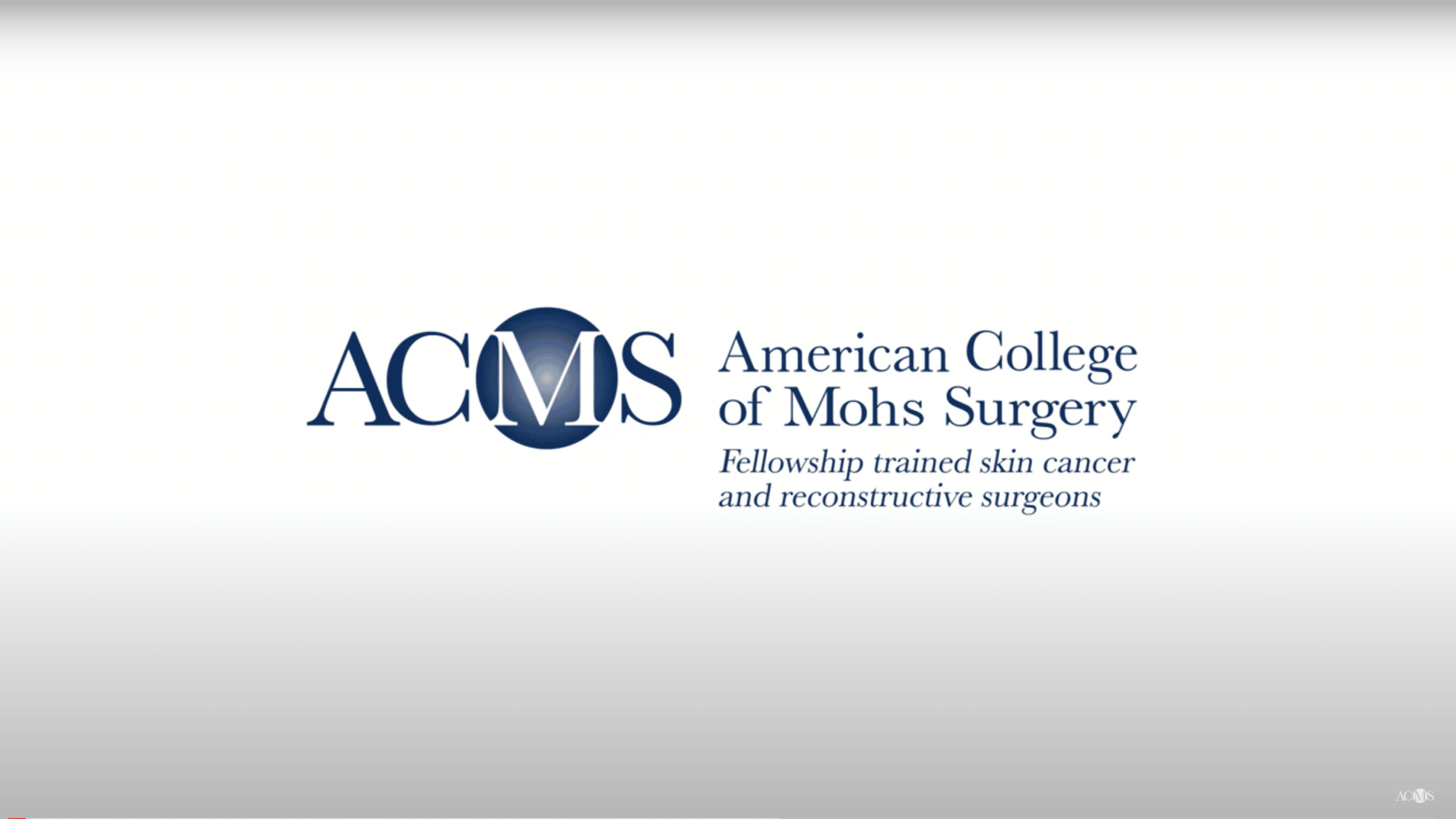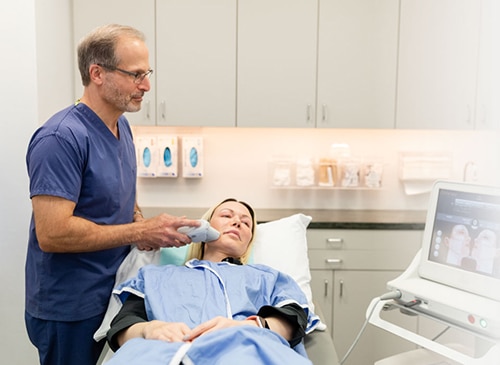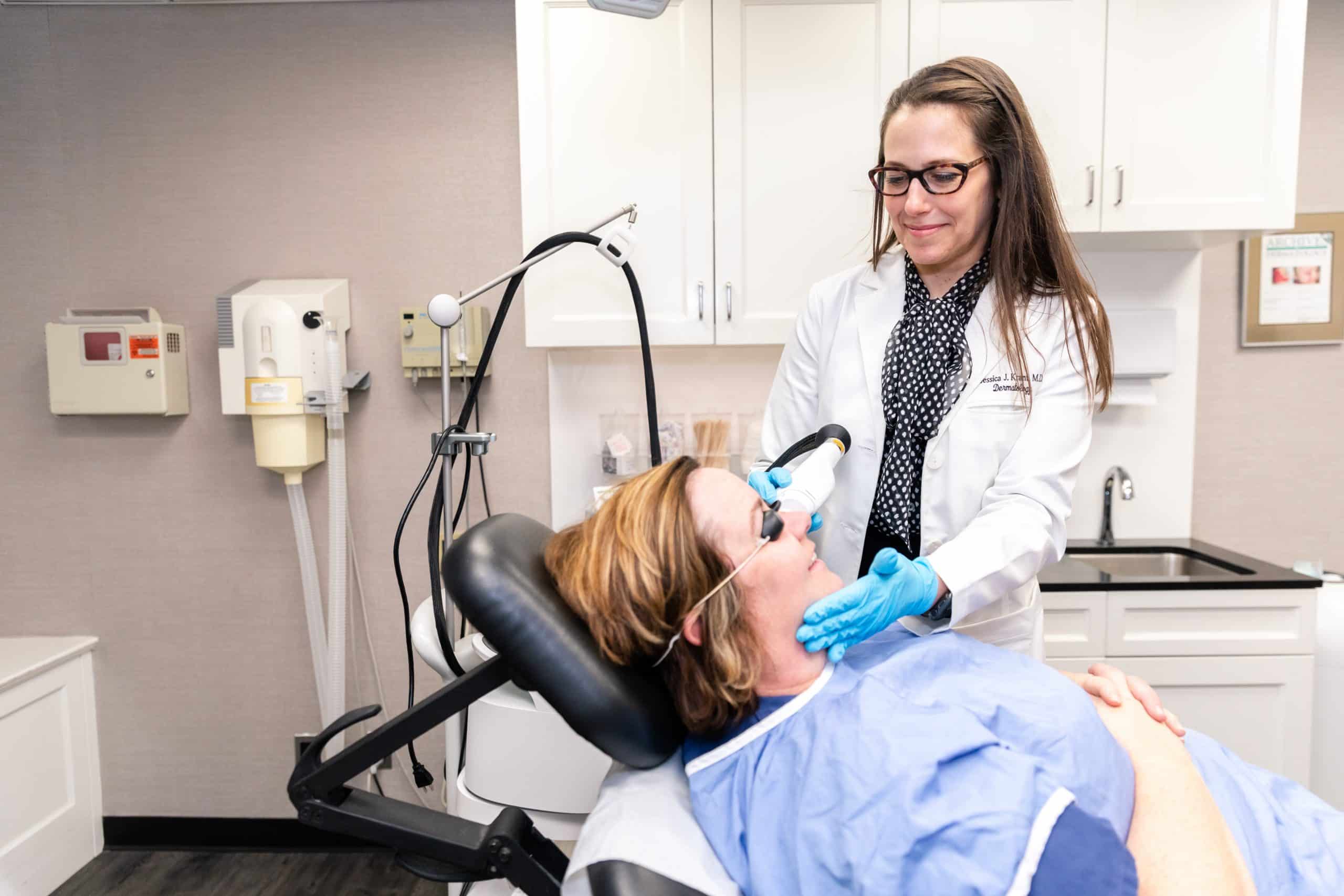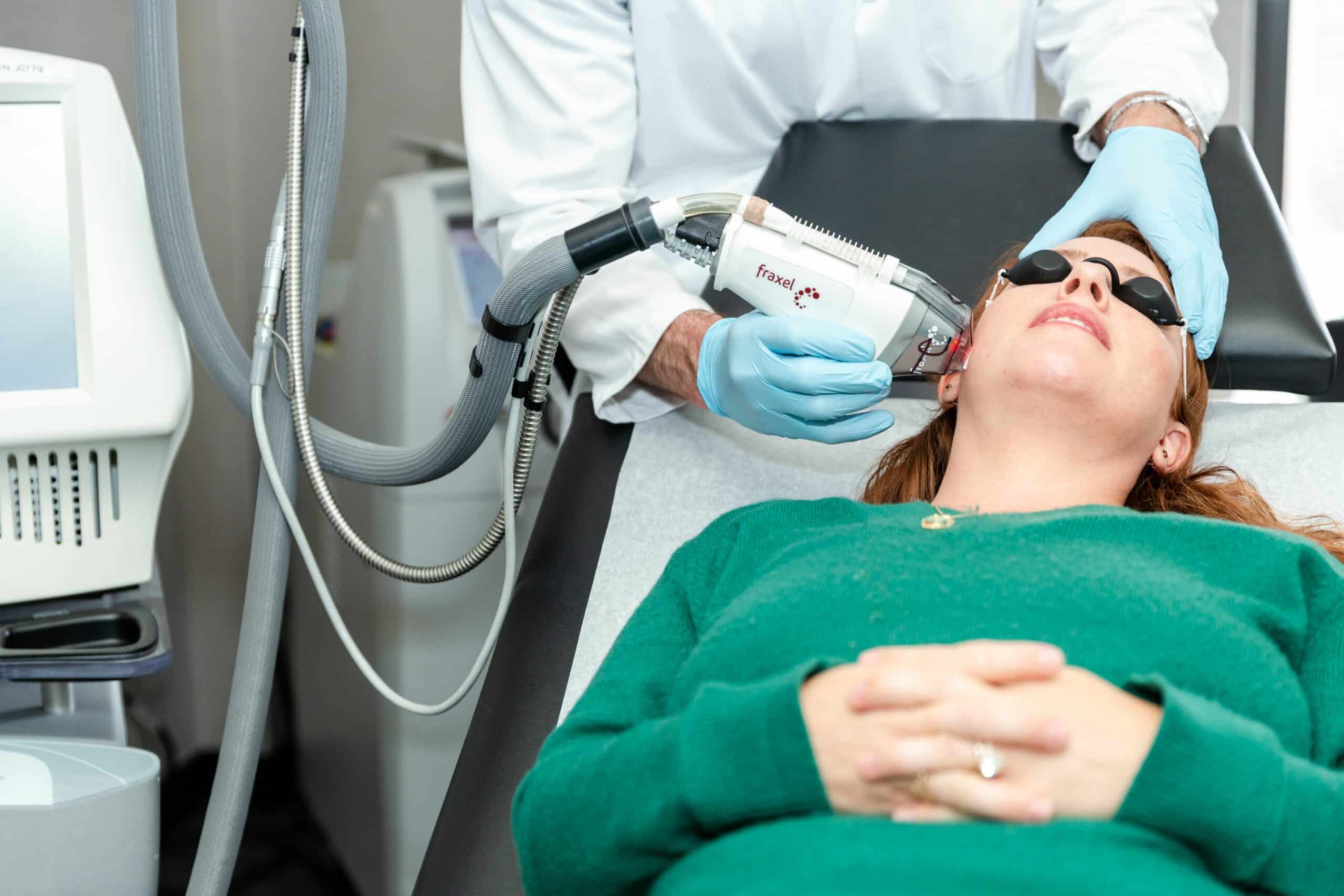Homepage // Conditions / Skin Cancer / Basal Cell Carcinoma
Basal Cell Carcinoma Overview New York, NY
Basal cell carcinoma is a type of skin cancer that oftentimes develops on skin that is frequently exposed to the sun.
basal cell carcinoma
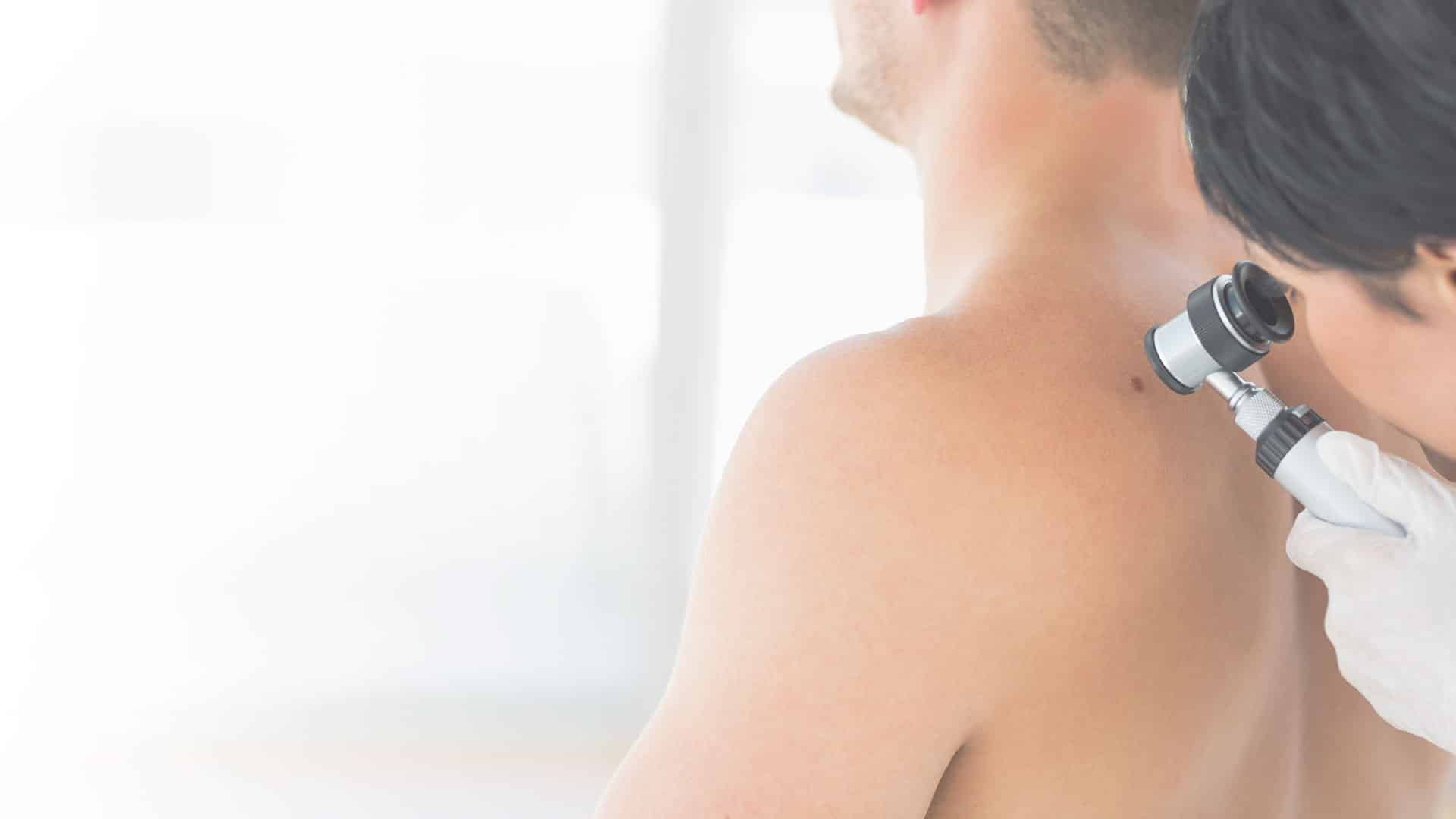
Basal cell carcinoma (BCC) is the most common type of skin cancer. They form in the basal cells of the skin which line the epidermis (the outermost layer of the skin) and are responsible for making new cells to replace the cells that die. Basal cell carcinomas result in tumors that appear on the surface of the skin, often in the form of growths, red patches, scars, sores, and bumps with rolled edges and/or a central indentation. BCCs may also itch, crust, ooze, or bleed.
what does it look like?
Basal cell carcinoma may look only slightly different than normal skin. The cancer may appear as skin bump or growth that is:
- Pearly or waxy
- White or light pink
- Flesh-colored or brown
In some cases, the skin may be just slightly raised or even flat. You may have:
- A skin sore that bleeds easily
- A sore that does not heal
- Oozing or crusting spots in a sore
- Appearance of a scar-like sore without having injured the area
- Irregular blood vessels in or around the spot
- A sore with a depressed (sunken) area in the middle
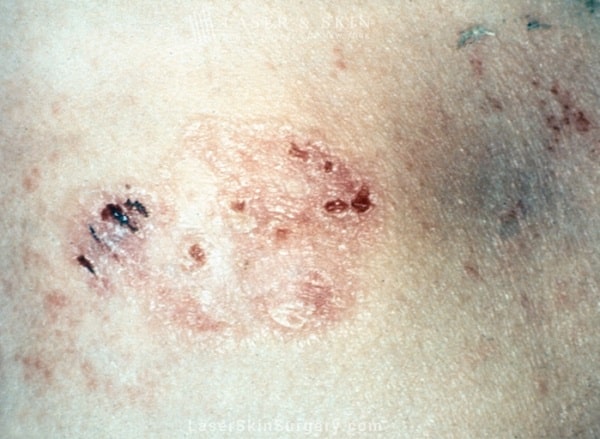
what is the treatment?
Mohs micrographic surgery is a specialized technique for the removal of certain types of skin cancer. The skin cancer is removed one layer at a time and analyzed microscopically while you are in the office. Once the skin layer is removed, it is stained and carefully diagrammed. It is then processed immediately in the office by a specially trained technician who converts the tissue into micrographic slides. These slides are then reviewed by the physician to determine if all of the malignant cells have been removed. If there is residual tumor, it is possible to determine precisely where it is located since the tissue was previously diagrammed. The exact area where the tissue persists is then removed by taking another layer of tissue, and the process is repeated. The surgery itself takes only several minutes; however, the tissue processing takes anywhere from twenty minutes to one hour, and then upon examination of the slides, a decision is made as to whether or not further surgery is indicated. Each procedure where tissue is removed is referred to as a stage.
WHAT ARE THE ADVANTAGES OF MOHS SURGERY?
The technique offers the highest possible cure rate for the treatment of skin cancer, compared to other therapeutic modalities. Mohs surgery also allows the physician to remove as little normal tissue as possible around the tumor, and thus in many cases can provide a superior cosmetic result. Our doctors also offer a variety of laser treatments to improve the appearance of scars after Mohs surgery. Another advantage is that with many large skin cancers, hospitalization can be avoided by performing Mohs surgery on an out-patient basis.
WHAT ARE THE CHANCES THAT MY SKIN CANCER WILL RETURN AFTER THE MOHS SURGERY?
Mohs surgery offers the highest cure rate of any treatment method. Our recurrence rate is well below 1%. If you have any questions, contact us at Laser & Skin Surgery Center of New York today!
Click here to learn more about Basal Cell Carcinoma.
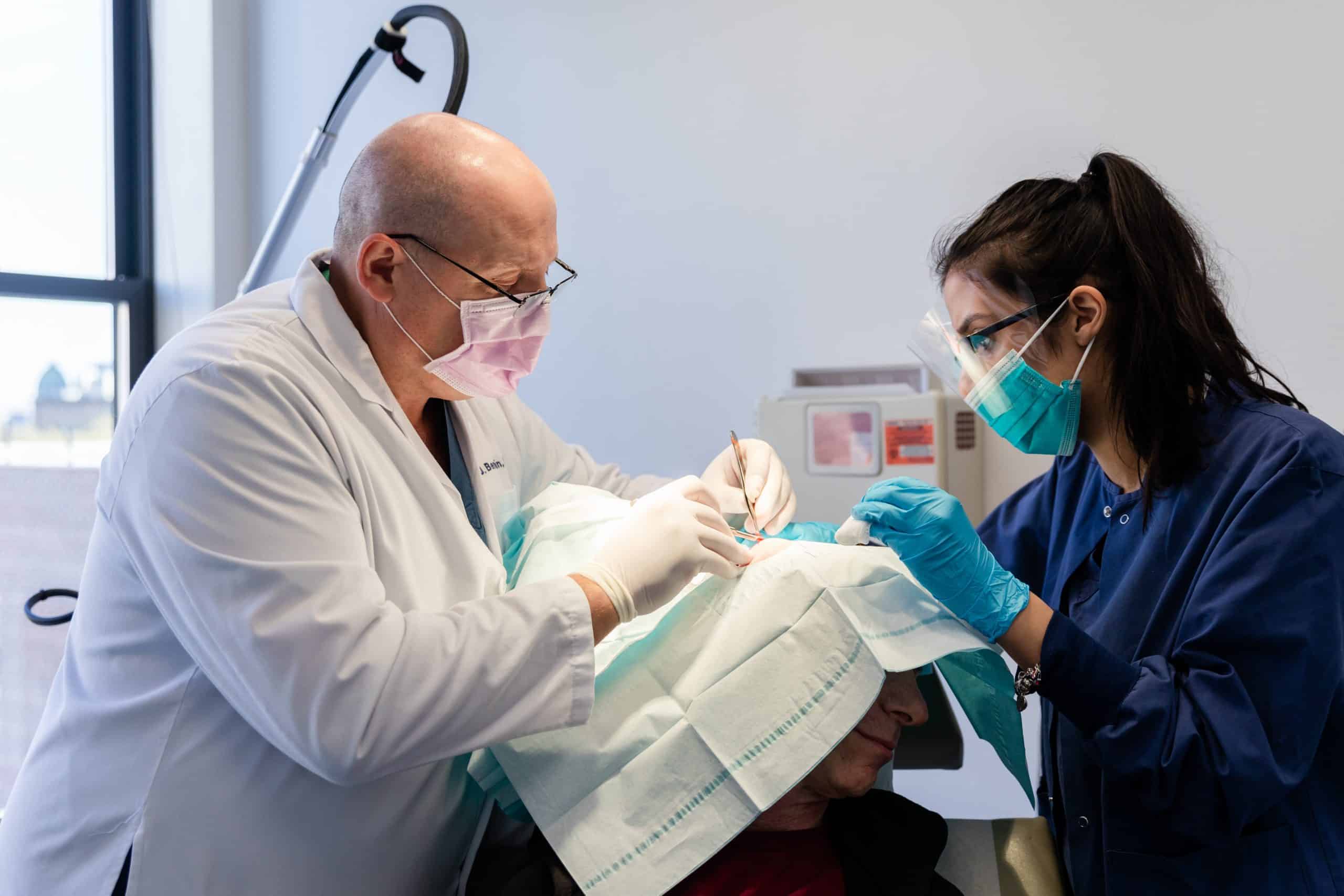
Real Patients Before and After photos
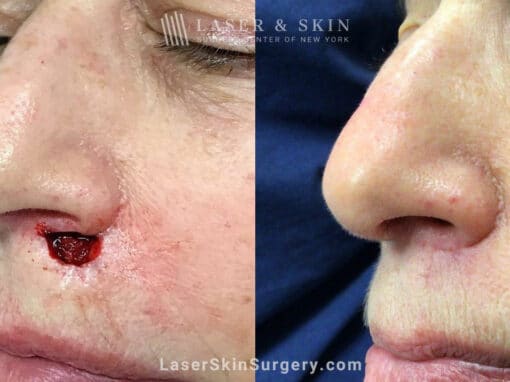
Mohs surgery to treat skin cancer near nose
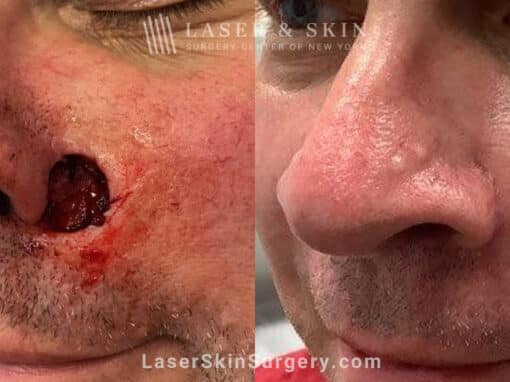
Mohs surgery to treat skin cancer next to nose
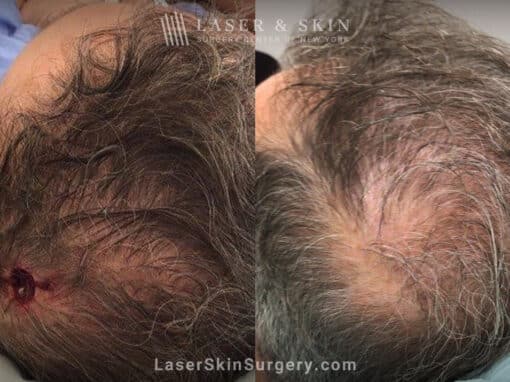
Mohs Surgery for Skin Cancer on the Scalp
In The News

Elle
Robert T. Anolik, M.D.

New York Times
basal cell carcinoma
Questions and Answers
Q: Are There Any Pre-Operative Instructions That I Should Follow?
A: Aspirin, aspirin-containing products and anti-inflammatory medications (such as Advil, Nuprin, Motrin, and Aleve), as well as vitamin E, should be avoided for one week prior to the surgery. If you are taking anti-coagulants or having clotting problems, please let the doctor know. You should otherwise continue to take all of your medicines and you should have a breakfast or lunch prior to the surgery. Heavy alcohol use and smoking should also be avoided for one week prior to your surgery.
Q: How Many Stages Of Surgery Will I Undergo?
A: The average patient undergoes two stages or procedures although 40% of all patients only require one stage.
Q: Why Choose An ACMS Fellowship Trained Mohs Surgeon?
A: Skin cancer is the most common form of cancer in America and early treatment from an experienced physician is vital. All of our Mohs Surgeons here at the Laser & Skin Surgery Center of New York undergo extensive Fellowship training under Roy G. Geronemus, M.D. Mohs micrographic surgery is a procedure that is widely accepted as the most effective method of treating many types of skin cancer. Fellowship training from the American College of Mohs Surgery indicates a higher level of education and skill which our physicians obtain in order to provide patients with the best possible care.
Our Mohs surgeons are amongst the most experienced in New York. In addition to their qualifications and experience, our laboratory is CLIA approved and accredited by the AAAHC. The procedures are performed in a comfortable outpatient setting with a warm and caring staff of registered nurses who assist our surgeons.
The ACMS, otherwise known as the American College of Mohs Surgery or Mohs College, was established in 1967. It was named after Frederic Mohs, MD, who developed the procedure and served as the first president of the Mohs College. From its inception, the Mohs College has promoted and continues to set the highest standards of patient care relating to the management of skin cancers, Mohs surgery, and reconstruction through its fellowship training process.
Q: What Are The Alternatives To Mohs Surgery?
A: Mohs surgery is the treatment of choice for recurrent skin cancers, skin cancers that arise in the skin that had previous x-ray treatment, and skin cancers near vital organs such as the eyes, mouth, nose, and ears. For uncomplicated skin cancers, alternative treatments include routine surgical excision, x-ray treatments or destruction of the tumor by burning or freezing, although the cure rate of these treatments is less than Mohs surgery.
Next, read about…
Sagging Skin
The skin’s underlying structure degrades over time, leading to skin laxity and sagging skin. Collagen, the essential protein in our skin, begins to decline as early as our 20s, leaving skin without support from within. Restoring collagen helps to restore the skin’s youthful vitality.
Wrinkles
Wrinkles are a common and unwanted sign of aging. As you age, your body produces less collagen, creating saggy and wrinkly looking skin. Our customized strategies to combat wrinkles include laser resurfacing, dermal fillers, and wrinkle relaxers.
Brown age spots
Age spots and brown spots (also known as sunspots, liver spots, and lentigines) are a consequence of aging and sun exposure. The most effective treatment for eliminating these spots and other skin pigmentation is laser therapy, which usually includes little to no downtime after treatment.
Haven’t found
WHAT you are looking for?
patient approved
Trusted Worldwide
patient approved
Trusted Worldwide
laser & skin surgery
center of new york
Contact us
Manhattan:
317 East 34th Street New York, NY 10016
Monday – Friday: 8:00am – 5:00pm
Same-Day Appointments Now Available
Southampton:
325 Meeting House Lane, Bldg. 1, Ste. C Southampton, NY 11968
Monday - Friday: 8:30am - 4:30pm
Same-Day Appointments Now Available
Pay Online for Patients of Drs. Anolik, Bae & Seidenberg
Pay Online for Patients of Drs. Abraham, Bernstein, Krant, Shelton, Weiss, Hoffman, Shim, Wilson, and Petratos
By LASER & SKIN SURGERY CENTER OF NEW YORK® | © 2025 All Rights Reserved. Design & Development by Goldman Marketing Group | Sitemap | Privacy Policy | The information available on this web site is provided for informational purposes only. This information is not intended to replace a medical consultation where a physician's judgment may advise you about specific disorders, conditions and or treatment options. We hope the information will be useful for you to become more educated about your health care decisions. If you are vision-impaired or have some other impairment covered by the Americans with Disabilities Act or a similar law, and you wish to discuss potential accommodations related to using this website, please contact us at 212.941.5055.
*MDs perform 100% of all medical and cosmetic treatments.
